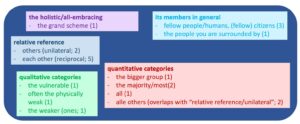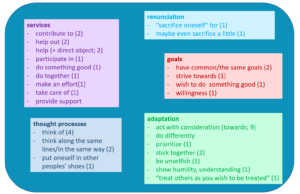Along with the word “hygge”, the Danish word “samfundssind” (roughly ‘community mindedness’) has recently become one of the few internationally known Danish words. The concept it stands for has achieved worldwide credit for the comparatively successful handling of the COVID-19 crisis in Denmark.
The word was first introduced into the Danish language in 1936 by Thorvald Stauning (Danish Prime Minister 1924 – 1926 and 1929 – 1942) to urge the Danish people to solidarity in the difficult times around World War II. Since then, the word has been used, but without anyone paying too much attention to it (the online dictionary of The Danish Language Council ordnet.dk quotes, for example, a passage from the regional newspaper Fyens Stiftstidende from 2007: “He was brought up by his teacher parents to show samfundssind and to make a difference”; author’s translation). The word’s quiet existence came to a drastic end when the current Prime Minister Mette Frederiksen re-introduced it during her very first COVID 19-related press conference on March 11th 2020. She used it, like Stauning, to urge the Danish population to show solidarity, more specifically to comply with the new measures that were supposed to inhibit the spread of the corona infection in Danish society. Ordnet.dk was also updated with a 2020 example from the national newspaper Politiken (“In Denmark, there has been a lot of talk about samfundssind in connection with preventing the spread of the virus and reducing the consequences of the pandemic”; author’s translation).
The word quickly became politically charged, from the great virtue, called for by the government and corona restriction supporters, to a symbol of an oppressive, custodial policy in the eyes of corona deniers and corona restriction opponents, with a myriad of nuances between these two poles.
But what does samfundssind really mean?
On the above-mentioned ordnet.dk, it is defined as “an attitude that testifies that one prioritizes taking care of the community more than narrow self-interests” and refers to “social responsibility” (author’s translations).
On social media, e.g. Facebook, the word is used in many different ways, with positive or negative connotations depending on one’s political point of view, both about corona-related (most commonly), but also other topics (such as charity or general political criticism).
In connection with a research project on the use of “samfundssind” on social media, I wanted to add some metalinguistic considerations of Danish language users about the meaning of the word to the picture.

Therefore, on 23 November 2021, I conducted a SurveyXact questionnaire survey (see Figure 1.) among my students of my course “Danish grammar and linguistic diversity” (1st semester at the BA in Linguistics, Aarhus University). There were 26 students (4 men, 22 women) present and all completed the questionnaire. One student’s contribution did not directly answer the questions – for this reason, the results below are based on 25 answers. The informant pool is not representative of the Danish population as a whole (the informants are university students, have a linguistic interest and already some professional training), so the results are only intended as a small qualitative insight. All quotes from the results are translations from Danish to English by the author.
In the following, I will first present the many-nuanced definitions given for question 1, then the comments on question 2, and finally the few comments generated by question 3.
The following aspects were covered by the answers: corona relevance, the individual or collective character of the phenomenon, definition of the concept of “society” in this context, the individual’s self-interest, moral aspects, concrete manifestations of the concept and political aspects.
Is samfundssind a corona thing? Although corona is clearly present in the minds of the respondents, the absolute majority among them defines “samfundssind” as a corona-independent concept: 16 responses, in their actual definition, did not relate to corona at all; the same was true for one additional respondent, who cited various examples (waste sorting, volunteer work, corona vaccine), with only the latter being corona-related; 5 responses defined the concept independently of corona, but cited only corona-related examples (e.g., wearing face masks, cancellation of birthday parties, vaccination); 2 responses related it primarily to corona (“especially in relation to corona rules and isolation”); only a single answer referred exclusively to the corona context, the definition in its entirety being: “The fact that one not only makes sure to be covid-tested for one’s own sake, but also for others’ [sake]. This also applies when you have been vaccinated. ”
The individual or society? At what level does samfundssind manifest itself? According to 15 answers, it is a matter that concerns the individual (e.g. “That you take into account, and think about, all other people in society, and not just think about yourself.”). For 4 respondents, it is a phenomenon that manifests itself on the collective level (e.g. “Thinking in the same way, having the same goal that you strive to achieve”). And for 5 respondents, it is a phenomenon that arises at both the individual and the community level (e.g. “That society is working together and has a common goal. Although the individual may not agree with what the majority thinks, you provide samfundssind by contributing and helping where the majority thinks it is needed […]. ”).
Who is society/the community? 8 responses define “samfundssind” in relation to “society/the community (as a whole)”. But the other 17 answers give an insight into what the very concept of “samfund” (‘community’/’society’) can cover (some give several suggestions). The definitions span from the holistic/all-embracing, the members of society/the community in general, quantity-related statements, quality-related statements to definitions that use pronouns that refer to specific individuals in relation to other individuals (relative reference): see Figure 2. Who is “samfundet” (‘society’/’the community’)?, which also contains the numerical distribution among the definitions.

Should it be at the expense of the individual? Ordnet.dk says “[…] one prioritizes taking care of the community more than narrow self-interests” (author’s transl.), but how do language users experience this moral imperative? Only 8 respondents state overruling of self-interest in their definitions; an additional informant does so but adds “of course without compromising one’s own quality of life”. 2 respondents define the concept by taking others into account and “not only” oneself. As many as 14 informants do not state overruling of self-interest in their definitions. Among these 14, there are 4 who regard “samfundssind” as a phenomenon arising at the collective level, hence the individual interest can automatically not be at the center; however, the remaining 10 responses include definitions that (also) see the phenomenon as a manifestation at the individual level.
Is there a moral aspect to it? The use of the word “narrow” (“narrow self-interests”) on ordnet.dk contains a moral assessment. There are also some references to moral aspects in the answers. The term “responsibility” (in connection with the verbal expression “live up to”) occurs twice; an answer contains both the concept of “ethics” and “obligation” (“Ethics in an accelerated culture – that we have obligations to each other”). One respondent contextualizes their definition: “[…] in the context […] of corona […] that one should do the “right thing” like everyone else.”, a definition which — by the use of the deontic modal verb “should” — reproduces the moral imperative whose sender/source is not specified here and could be both “government” and “society/the community” (or an unspecified “majority”).
How do you show samfundssind concretely? According to the respondents, one demonstrates “samfundssind” through active services, renunciation or at least adaptation of one’s own patterns of behavior, by having certain objectives and finally by exhibiting certain forms of thought: see Figure 3. How does one exhibit “samfundssind” (‘community mindedness’)?, which also contains the numerical distribution among the given suggestions.

How much does samfundssind have to do with politics? Given that the concept was reintroduced by a politician for the purpose of guiding the actions of the people, it is inevitably tied to politics. One answer makes this very clear: “During the corona crisis, however, I think that ‘samfundssind’ has been used as a word that describes the behavior that the government would like to see people comply with.” And yet it is not only narrow government policy that the concept is associated with, but also a civic political (democratic) understanding in the population. 2 answers bring the concept in connection with “(Danish) democracy”, and a further answer defines it as “a willingness to live up to the responsibilities that the majority of ‘society’/’the community’ has agreed on are important to carry out.” (my emphasis). A final answer confirms the political coloring of the concept by explicitly distancing itself from it: “In my mind, samfundssind does not have much to do with politics or economics, but with ”tryghed” (‘being/feeling safe’), health and “medmenneskelighed” (’consideration (for fellow humans)’/‘compassion’)”. “Tryghed” and “medmenneskelighed” are both Danish concepts with high societal signal value.
Could others have a different definition? The reactions to this, the second question from the questionnaire, are very mixed. 4 respondents answered with a clear no, while a further 3 thought that others would probably define the term “roughly” as themselves. In 6 responses, it is stated that others could probably have other definitions, but no concrete suggestions are given. One respondent believes that during the current corona crisis there is probably agreement among all regarding a definition but does not know if this would have been different before the corona pandemic, or if the concept itself even existed before then. Two respondents believe that other peoples’ definitions could be broader than their own corona-specific one, but do not state what this could cover. In one answer, there is speculation as to whether at some point in the future it might be possible to expand the concept, possibly to climate questions, but this consideration is subsequently rejected. One respondent suggests that the concept, by others, could be associated with “a certain degree of national feeling and “unity”, while another respondent states that others could possibly bring samfundssind together with “Jantelov” (another Danish-Norwegian concept referring to a supposedly existing unwritten societal law that prohibits the individual to excel and/or claim to do, unless they want to risk public ridicule, shaming and/or public expression of glee in case of downfall). In 2 answers, it is mentioned that the definition will probably be common to all, but that the importance of the concept is not the same for everyone. 4 respondents see the definition question as context-dependent: the definition depends on one’s opinion of what is best for society/the community (1), or can be positive or negative depending on whether one agrees with the majority on what is important (1), or that it could possibly be very negative for some (2), especially if one has experienced “negative consequences” during the corona crisis (1), and finally, that the definition could depend on one’s “boundaries and points of anxiety” (1).
Can one say more about “samfundssind”? 19 respondents had no further comments. The 6 comments made go in different directions. 3 answers relate to the use of the word: that the term, despite its clear definition, becomes vague when used in political contexts; that it is reminiscent of “krænkelsesparathed” (‘readiness to experience/detect offence’, yet another Danish concept) and the “Me Too” movement, both of which have –according to the respondent- a negative connotation, as language users get tired of being required to take a stance on these concepts; and – in continuation of the latter – that the respondent does not use the word themselves, as it has become a cliché. 2 responses express self-reflections: that the respondent is not sure what the term, despite its clear definition, means to themselves; that the respondent tries to exercise samfundssind, but does not think that they are as good at it as they could be. And a final answer refers to the socio-historical origin of the phenomenon, which I would like to leave as a final – very illustrative – quote: “It is a very Danish/Nordic way of thinking that everyone is part of society and bears part of the responsibility for making it work well. ”
Hence, what is “samfundssind”? A not exclusively corona-related Danish/Nordic way of thinking and acting, which manifests itself on the individual and the collective level, where you join forces and sometimes ignore your own needs for the benefit of everyone else or even of only a few; sometimes, however, it can become too much with these political-moral imperatives, and then some may well start to grumble.
Many thanks to my students for their contributions to this survey!
References:
- Linguist Marianne Rathje, Danish Language Council, about ”Samfundssind” in an interview with the BBC: https://www.bbc.com/worklife/article/20200802-how-the-long-forgotten-word-samfundssin-rallied-a-nation
- ordnet.dk: https://ordnet.dk/ddo/ordbog?query=samfundssind
- Mette Frederiksen’s Facebook post from December 18th 2020: https://www.facebook.com/mettefrederiksen.dk/photos/samfundssind-er-%C3%A5rets-ord-efter-et-h%C3%A5rdt-%C3%A5r-med-mange-afsavn-st%C3%A5r-samfundssind-t/10158726665497719/
- “hygge“: https://en.wikipedia.org/wiki/Hygge
- “tryg”/”tryghed”: https://en.wiktionary.org/wiki/tryg
- ”medmenneskelighed”: no wiki entry as of yet
- ”Jantelov”: https://en.wikipedia.org/wiki/Law_of_Jante
- ”krænkelsesparat”: https://en.wiktionary.org/wiki/kr%C3%A6nkelsesparat
Alexandra R. Kratschmer is an associate professor at the Department of Linguistics, Aarhus University, and is working on a collective research project (together with Antoinette Fage-Butler, Rebekah B. Baglini and Kristoffer L. Nielbo) on the use of the term “samfundssind” in public Danish Facebook groups since the term’s re-introduction into Danish society in March 2020.







